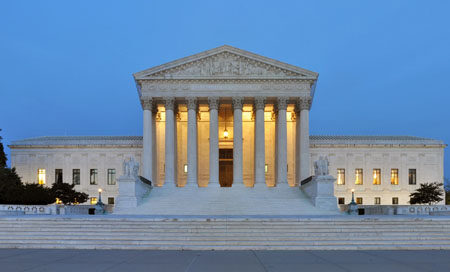by WorldTribune Staff, October 6, 2025 Real World News
The Supreme Court is set to hear a key election integrity case filed by government watchdog group Judicial Watch on behalf of Congressman Mike Bost and two presidential electors, who are before the court to vindicate their standing to challenge an Illinois law extending Election Day for 14 days beyond the date established by federal law.
The Supreme Court has scheduled oral argument for Oct. 8.

This is an appeal of the decision of the U.S. Court of Appeals for the Seventh Circuit, finding that Bost and the electors lacked standing to challenge Illinois’ practice of counting ballots received up to 14 days after Election Day. The Election Day lawsuit was initially filed on May 25, 2022.
“This is a historic challenge to the outrageous practice of states counting votes days and weeks after Election Day,” said Judicial Watch President Tom Fitton in a press release.
Judicial Watch’s new Supreme Court brief states:
Illinois counts mail-in ballots received up to two weeks after Election Day. Petitioners, candidates for federal office, claim that under controlling federal law that is two weeks too long. As a result, Illinois is counting unlawful ballots and producing inaccurate vote tallies, while simultaneously hurting petitioners’ prospects at the ballot box and injuring their pocketbooks. Everyone from the United States to the ACLU and the ACLJ agrees that petitioners have standing. Illinois disputes that remarkable consensus only by ignoring common sense (and the dangers produced by the Seventh Circuit’s rule) and by imagining non-existent waivers that did not deter the Seventh Circuit from denying standing because Congressman Bost’s electoral prospects were too bright and his pocketbook injuries too speculative.
Judicial Watch submits that the Seventh Circuit’s decision “is wrong and dangerous:”
It is wrong because candidates have standing to challenge the rules that govern their elections, especially when their merits theory (which must be credited for standing purposes) is that the challenged rule produces an inaccurate final tally. At a minimum, the candidate has standing when (as here) he plausibly alleges that the challenged rule will harm his electoral prospects and reduce his bank balance because he needs to pay campaign staff an extra two weeks. And the decision is dangerous because it forces judges to play political prognosticators, skews standing rules to favor certain kinds of candidates, and funnels election disputes to the worst possible context—namely, after the election where judges are asked to declare political winners. This Court should reverse.
Judicial Watch states that Bost has standing to challenge the Illinois law:
At the very least, Congressman Bost has standing to challenge the Illinois ballot-receipt deadline here, as a host of diverse amici confirm. Congressman Bost plausibly alleged a substantial risk that counting mail-in ballots received after Election Day will harm his electoral prospects both by risking electoral defeat and reducing his margin of victory. The plausibility of those allegations was amply reinforced by the Illinois Democratic Party’s attempted intervention and voting and litigation patterns nationwide. And he has also plausibly alleged a classic pocketbook injury because he expended additional campaign funds as a direct result of the state’s extended deadline for receiving mail-in ballots. Here too, the notion that an election artificially extended a fortnight costs more than one that ends on Election Day hardly strains credulity. The state’s contrary arguments lack merit.
